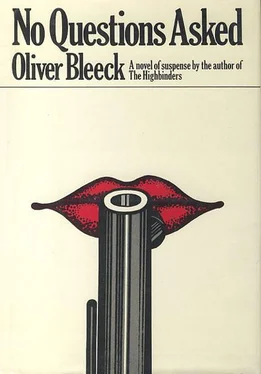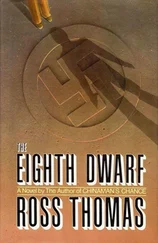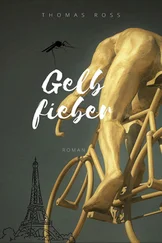Ross Thomas - No Questions Asked
Здесь есть возможность читать онлайн «Ross Thomas - No Questions Asked» весь текст электронной книги совершенно бесплатно (целиком полную версию без сокращений). В некоторых случаях можно слушать аудио, скачать через торрент в формате fb2 и присутствует краткое содержание. Город: New York, Год выпуска: 1976, ISBN: 1976, Издательство: William Morrow, Жанр: Детектив, на английском языке. Описание произведения, (предисловие) а так же отзывы посетителей доступны на портале библиотеки ЛибКат.
- Название:No Questions Asked
- Автор:
- Издательство:William Morrow
- Жанр:
- Год:1976
- Город:New York
- ISBN:978-0-688-03011-7
- Рейтинг книги:3 / 5. Голосов: 1
-
Избранное:Добавить в избранное
- Отзывы:
-
Ваша оценка:
- 60
- 1
- 2
- 3
- 4
- 5
No Questions Asked: краткое содержание, описание и аннотация
Предлагаем к чтению аннотацию, описание, краткое содержание или предисловие (зависит от того, что написал сам автор книги «No Questions Asked»). Если вы не нашли необходимую информацию о книге — напишите в комментариях, мы постараемся отыскать её.
Interestingly, the owner of the book, PI Jack Marsh, has been kidnapped as well. St. Ives soon finds himself involved in a deadly game of deception and murder.
No Questions Asked — читать онлайн бесплатно полную книгу (весь текст) целиком
Ниже представлен текст книги, разбитый по страницам. Система сохранения места последней прочитанной страницы, позволяет с удобством читать онлайн бесплатно книгу «No Questions Asked», без необходимости каждый раз заново искать на чём Вы остановились. Поставьте закладку, и сможете в любой момент перейти на страницу, на которой закончили чтение.
Интервал:
Закладка:
“Prior to the eighteenth of September, 1469. Contemporary accounts reveal that only one hundred of the books were printed. Fortunately, the Library has another copy, which is part of the Rosenwald collection. But this particular volume, the one that was stolen, is the only one printed on vellum and is in much better condition than ours and, of course, is far, far more valuable. We were terribly upset by its theft.”
“Tell me about it.”
“The theft?”
“Yes.”
“First, I should make it clear that the book was only on deposit with the Library. This means, in effect, that its owner had lent it to us with the understanding that we would use our own discretion in making it available to interested scholars. We were, I should add, awfully pleased to acquire it, even on a deposit basis. Last week, last Tuesday to be precise, the owner informed us that the book was to be withdrawn from deposit. We expressed our dismay, of course, but when the owner proved adamant, we offered to return the volume under special security arrangements.”
“What kind of arrangements?” I said.
Laws took a sip of his coffee. “It depends upon the book, of course. But for one as valuable as the Pliny volume we would dispatch one of our senior staff members accompanied by an armed guard.”
“But this didn’t happen.”
“No. The owner demurred and made other arrangements.”
“Which were?”
“A private investigator, a Mr. Marsh, arrived yesterday morning and presented his credentials. We checked them carefully and turned the book over to him. Mr. Marsh has not been heard from since.”
“What do the police say?”
“Quite frankly, Mr. St. Ives, I believe that the police are stumped. A Lt. Fastnaught is in charge of the investigation.”
“Does he have curly blond hair and shiny blue eyes?”
“Why, yes, do you know him?”
“When I knew him he was only a sergeant, but he seemed ambitious. I guess it paid off. He hasn’t got any leads, huh?”
“None, I’m afraid, but he hasn’t exactly taken me into his confidence.”
“The owner of the book?” I said.
“Yes?”
“Is he some kind of a nut?”
Laws smiled. It was a sad little smile which seemed to say that no, the owner wasn’t a nut, just eccentric, more’s the pity. “The owner is a she, Mr. St. Ives, a Miss or perhaps Ms. Maude Goodwater. Does the name Joiner Goodwater mean anything to you?”
“It rings a bell, but faintly,” I said. “It has something to do with a lot of money that was made fast.”
“Uranium,” Laws said. “In the spring of 1947 Joiner Goodwater was a teacher of high-school science in Salt Lake City. That summer he went out into the Utah desert equipped with not much more than an army surplus Jeep, a canteen of water, a case or two of K rations, and a Geiger counter. When he came back in from the desert in late August he was an incredibly rich man.”
“I remember,” I said. “He found some of the richest uranium deposits in the country, and the papers started calling him the Uranium King. I also sort of remember that he spent it as fast as he made it.”
“Not quite,” Laws said. “But he seemed driven by the need to establish the Goodwater name as being among the principal art patrons of the country along with Guggenheim and Frick and Mellon and Rosenwald and even, I suppose,” and here Laws sniffed a little, “Hirshhorn. Well, to make a sad story as brief as possible, he bought fine paintings by the yard and rare books by the case, but unfortunately the paintings that he bought were either not terribly good or masterful forgeries. He became, I regret to say, in art circles, at least, something of a laughingstock. Fortunately, he was more successful in the field of rare books. He concentrated on collecting rare scientific works and succeeded in putting together quite a nice little collection, the principal piece being, of course, the Pliny volume. It was placed on deposit with us a little more than ten years ago with the tacit understanding that upon Mr. Goodwater’s death it would become part of our permanent collection.”
“He died, didn’t he,” I said. “About five years ago.”
“Six,” Laws said. “I think he died a broken, bitterly disappointed man. I knew him slightly, and he struck me as a man who — and I’m not being unkind — should have stayed in his high-school science laboratory. He was utterly unequipped for the business world in which he found himself.”
“I remember reading about some of that,” I said. “He got taken by every slick operator who came along.”
“Not only that,” Laws said, “but he began to have serious tax problems. What the slick operators, as you call them, didn’t get, the tax people and the lawyers did, and when he died he was a relatively poor man.”
“What’s a relatively poor man?”
“Well, he had sold off his entire rare book collection, except for the Pliny volume. After the government collected what it said he owed in taxes, I think his estate consisted of a house in Los Angeles, some terribly well-forged paintings, and perhaps a hundred thousand dollars or so in other assets.”
“What did he go through — a couple of hundred million?”
“Something like that, I think.”
“And now the Pliny book is about all that’s left, except that it’s been stolen.”
“Yes.”
“When the daughter, what’s her name, Maude, decided to withdraw the Pliny volume from deposit, how did she go about it?”
Laws thought for a moment. “Her attorney in Los Angeles wrote to me on his letterhead advising me of her decision. I immediately got in touch with him by telephone, in an attempt to persuade him to help me change her mind.”
“Did you ever talk to her?”
“Oh, yes. Several times. It really is a most remarkable volume, and we were quite reluctant to see it leave the Library. Then, too, there was that tacit understanding that it would become part of the Library’s permanent collection upon the death of Mr. Goodwater. Unfortunately, tacit agreements don’t hold up too well in court, according to the Library’s eminent legal counsel.” Laws smiled faintly. “Of course, I’m not sure that we ever would have gone to court, although we can get rather tigerish when it comes to parting with a book as important as the Pliny.”
“So you couldn’t persuade the daughter?”
He shook his head. “She said that although she would very much like to leave it with the Library as a memorial to her father, she needed the money, and she had received a very generous offer for it, which she had decided to accept.”
“Did she say whom the offer was from?”
“No, because she said the buyer insisted on remaining anonymous. However, she did tell me how much the offer was because I was hoping that if it were not too high the Library might have been able to match or perhaps even better it.”
“But you weren’t?”
Again Laws shook his head. “As I mentioned earlier, the Pliny would have been snapped up at five hundred thousand. Although I knew that we couldn’t have come up with that amount out of our budget, I felt I could have gone to some private friends of the Library and possibly raised it from them, although money, as you know, is terribly tight these days.”
“So how much was the offer that she got?”
Laws sighed. “Three-quarters of a million dollars.”
I didn’t whistle because I felt that Laws might feel that whistling was tacky. “Who has that kind of money?”
“Quite frankly, nobody,” Laws said. “As you may suspect, Mr. St. Ives, we have an old-boy network in the rare book field, and I confess that I employed it in an attempt to find out who was making such an extraordinary offer for the Pliny. The consensus was that nobody was making such an offer, by that I mean nobody who was either a dealer or a collector. So we — the old boys, I suppose one might call us — concluded that someone was buying it as an investment.”
Читать дальшеИнтервал:
Закладка:
Похожие книги на «No Questions Asked»
Представляем Вашему вниманию похожие книги на «No Questions Asked» списком для выбора. Мы отобрали схожую по названию и смыслу литературу в надежде предоставить читателям больше вариантов отыскать новые, интересные, ещё непрочитанные произведения.
Обсуждение, отзывы о книге «No Questions Asked» и просто собственные мнения читателей. Оставьте ваши комментарии, напишите, что Вы думаете о произведении, его смысле или главных героях. Укажите что конкретно понравилось, а что нет, и почему Вы так считаете.












